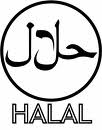Anyone who has the business acumen in food production or exportation are duly encouraged to capture a share of a huge global halal market and trade estimated between $580 billion to $1.20 trillion.
The halal business is becoming more lucrative but at the same time more complex and challenging.
To effectively capture the halal markets, there is a need for the industry to understand the Muslim consumers’ religious needs and behavior, food purchase, consumption pattern and in order to develop and widen the halal market and product acceptability.
Halal is an Arabic word, meaning lawful, permitted or acceptable. The word can refer to anything that is within the tenets allowed by God for mankind and religiously enjoined upon to the believers of Islam. As such, halal has evolved to be a basic quality standard to reckon with.
The Muslim consumers worldwide are estimated at 1.50 to 1.80 billion spread in over 100 countries. Although the halal market is the largest market in the world, Muslim still have difficulties in choosing halal products for simple reason that they do not know whether what they are consuming is halal or not.
Hence, the situation has aggravated the low supply of halal products. The middle East is not the only destination for halal products. The global market is a potential wide market for exporters as consumers now are more conscious of nutritious and healthy foods which halal products also are all about.
India, Pakistan, Bangladesh, China and South Africa are others important halal markets. To take full advantage of the market, one has to determine the peak consumption period and what particular product that has a high demand but of low supply.
Roughly, about 400 halal products are already available in the market ranging from food to non-food products.
It would be of the best interest to anyone who wanted to venture of such a business to address foremost, its consumers’ need and their right to access quality and credible source of halal products based on their standard criteria of preparation.
